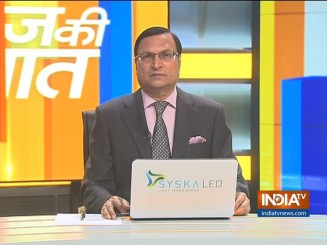 Though talks between the leaders of 35 farmers’ outfits and the government remained inconclusive on Tuesday, there were signs of accommodation from both sides. For the first time, a channel of communication has opened to break the deadlock. It was a good start as both sides discussed the farm laws for nearly four hours which included a presentation on the new legislations by the government to dispel misgivings.
Though talks between the leaders of 35 farmers’ outfits and the government remained inconclusive on Tuesday, there were signs of accommodation from both sides. For the first time, a channel of communication has opened to break the deadlock. It was a good start as both sides discussed the farm laws for nearly four hours which included a presentation on the new legislations by the government to dispel misgivings.
The government has sought point-wise specific objections on the new laws from farmer leaders which will be taken up by the government clause by clause at the second round of talks due on Thursday. On Wednesday, two senior ministers Piyush Goyal and Narendra Singh Tomar briefed Home Minister Amit Shah about the outcome of the first round. There was another meeting on Tuesday with Bharatiya Kisan Union leaders led by Rakesh Tikait, representing UP and Uttarakhand farmers, in the evening.
The questions before all of us is: what is the way forward? What could be the solution? In the first round of talks, Agriculture Minister Narendra Singh Tomar proposed setting up of an experts committee to study the new laws, but this was not accepted by the farmer leaders. They said, the government should have done this before preparing the new laws. The farmer leaders told the government in no uncertain terms that they would not suspend their agitation until and unless the new laws are withdrawn.
Even as the talks were going on, thousands of farmers continued to sit on dharna at Singhu border, Tikri border, Burari ground, Chilla border and Ghazipur border, resulting in huge traffic jams and blockage of traffic movement. With the borders of Delhi under siege, Delhi Police on Tuesday issued a list of routes for motorists for smooth movement. The Jannayak Janata Party, an ally of BJP in Haryana government, demanded that the provision for continuance of MSP scheme must be incorporated in the new farm laws.
By initiating talks with farm leaders, the Modi government has sent out a positive signal. The talks were originally due on December 3, but considering the present deadlock created on Delhi borders, the talks were preponed, without any condition. The government has sent out the message that it is not rigid in its attitude, nor is its intention doubtful. The farmers have also sent out a positive message by joining the talks without any pre-conditions.
The farmers realize that in a democracy, all big problems can be solved peacefully only through talks. By resorting to agitation, they have clearly indicated that they are not happy with the new laws. Listening to Narendra Tomar’s remarks after the meeting, it is clear that the government has an open mind on the issue, and it is not indulging in any political upmanship with the farmers. If there is trust from both sides, a solution can be found out. But there are also vested interests who want to take advantage of the crisis and are instigating the farmers to take an extremist path.
Leaders of small time political outfits like Chandrashekhar Ravana of Bhim Army and Pappu Yadav from Bihar appeared before farmers on Tuesday to express their solidarity. Even if one admits that these leaders are concerned about the farmers, I do not find why the old lady Dadi from Shaheen Bagh and the Prime Minister of Canada Justin Trudeau came forward to express their support. They have nothing to do with the problems and grievances of Indian farmers.
Of course, Justin Trudeau has spoken because of the presence of a large number of Indian origin Sikh voters from Punjab in his country, whose support during elections in Canada matters a lot for him and his party. Trudeau has said that Canada will always be there to defend the right of peaceful protest (by farmers) and it was a matter of concern for him. In reply, the Indian Ministry of External Affairs on Tuesday said that “ill-informed comments by Canadian leaders relating to farmers in India.. are unwarranted”. British leaders John McDonnell and Tan Dhesi criticized the handling of farmers’ protests in India. These British leaders are known Modi-baiters and it is time for India to tell them clearly that it is a domestic issue to be resolved by the Indian government and Indian farmers.
The agitating farmers must also realize that there are outside forces trying to take advantage of their agitation. Some protesters have even put up pro-Khalistan posters at the site, which is clearly an anti-national act. It is gratifying to note that most of the farmers asked these people to stay away from their agitation and they were sidelined. The farmers must know that there is no single leadership that is spearheading their agitation and outsiders, like those from Tukde-Tukde gang and pro-Khalistan elements, may try to take advantage. Extreme caution is the need of the hour.